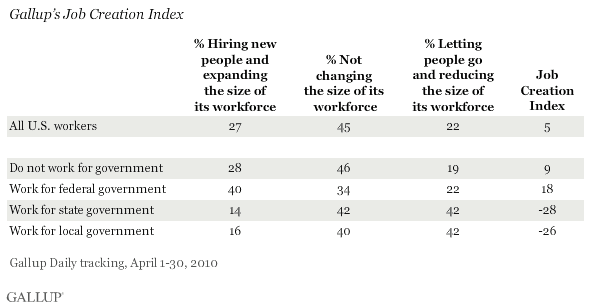PRINCETON, NJ -- Gallup's Job Creation Index for April reveals significantly more hiring within the federal government than in the private sector. Both show a substantially more positive picture than state and local governments, where firing far eclipses hiring.

Gallup's Job Creation Index is based on the percentage of American workers who say their employers are hiring minus the percentage who say their employers are letting workers go. The overall Index value for American workers in April tilts positive, with 27% of workers saying their places of employment are hiring, and 22% saying their employers are letting people go -- resulting in an overall +5 Job Creation Index.
These overall numbers, however, mask significantly different patterns across employment sectors. Based on these reports from workers, the federal government is a growth industry, while employment at state and local governments is shrinking.
By almost a 2-to-1 margin, federal employees say their employer is hiring rather than firing, giving the federal government a relatively robust +18 Job Creation Index for April. (Federal workers make up about 5% of the sample of workers Gallup interviewed in April.) This contrasts with Index values of -28 among state and -26 among local government workers (about 7% and 5% of Gallup's workforce sample, respectively). The Job Creation Index among private-sector and other non-government workers is +9.
Bottom Line
Gallup's Job Creation Index clearly indicates that state and local governments are in the midst of significant downsizing, no doubt reflecting budgetary issues resulting from recessionary pressures on the tax (and other) revenue that funds these governments.
Hiring at the federal level has apparently to date escaped these same fiscal pressures. Indeed, the federal government appears to be significantly outpacing the private sector in terms of the relative number of jobs created.
How long this pattern will continue is difficult to project. The federal budget deficit is likely to become a prominent element of political debate in the months and years ahead, thus opening up the possibility of increased employment pressures at the federal level. At the moment, however, the federal government is one of the brightest spots in the nation's hiring picture.
Results are based on telephone interviews with 16,171 national adults, aged 18 and older, conducted April 1-30, 2010, as part of Gallup Daily tracking. For results based on the total sample of national adults, one can say with 95% confidence that the maximum margin of sampling error is ±1 percentage point. Margins of sampling error for subgroups of the worker population will be proportionately larger.
Interviews are conducted with respondents on landline telephones (for respondents with a landline telephone) and cellular phones (for respondents who are cell phone only).
In addition to sampling error, question wording and practical difficulties in conducting surveys can introduce error or bias into the findings of public opinion polls.
